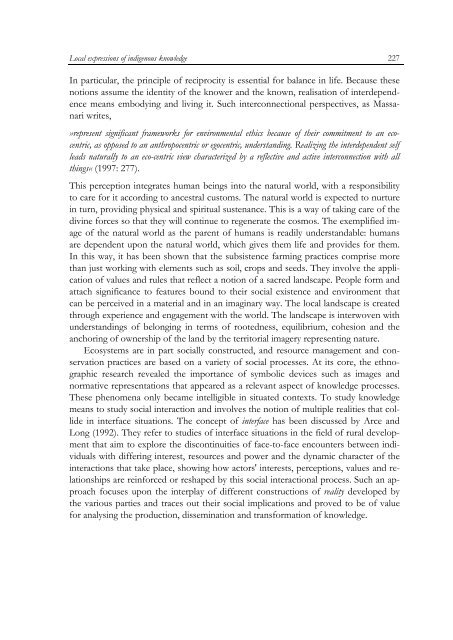The cultural context of biodiversity conservation - Oapen
The cultural context of biodiversity conservation - Oapen
The cultural context of biodiversity conservation - Oapen
Create successful ePaper yourself
Turn your PDF publications into a flip-book with our unique Google optimized e-Paper software.
Local expressions <strong>of</strong> indigenous knowledge<br />
In particular, the principle <strong>of</strong> reciprocity is essential for balance in life. Because these<br />
notions assume the identity <strong>of</strong> the knower and the known, realisation <strong>of</strong> interdependence<br />
means embodying and living it. Such interconnectional perspectives, as Massanari<br />
writes,<br />
»represent significant frameworks for environmental ethics because <strong>of</strong> their commitment to an ecocentric,<br />
as opposed to an anthropocentric or egocentric, understanding. Realizing the interdependent self<br />
leads naturally to an eco-centric view characterized by a reflective and active interconnection with all<br />
things« (1997: 277).<br />
This perception integrates human beings into the natural world, with a responsibility<br />
to care for it according to ancestral customs. <strong>The</strong> natural world is expected to nurture<br />
in turn, providing physical and spiritual sustenance. This is a way <strong>of</strong> taking care <strong>of</strong> the<br />
divine forces so that they will continue to regenerate the cosmos. <strong>The</strong> exemplified image<br />
<strong>of</strong> the natural world as the parent <strong>of</strong> humans is readily understandable: humans<br />
are dependent upon the natural world, which gives them life and provides for them.<br />
In this way, it has been shown that the subsistence farming practices comprise more<br />
than just working with elements such as soil, crops and seeds. <strong>The</strong>y involve the application<br />
<strong>of</strong> values and rules that reflect a notion <strong>of</strong> a sacred landscape. People form and<br />
attach significance to features bound to their social existence and environment that<br />
can be perceived in a material and in an imaginary way. <strong>The</strong> local landscape is created<br />
through experience and engagement with the world. <strong>The</strong> landscape is interwoven with<br />
understandings <strong>of</strong> belonging in terms <strong>of</strong> rootedness, equilibrium, cohesion and the<br />
anchoring <strong>of</strong> ownership <strong>of</strong> the land by the territorial imagery representing nature.<br />
Ecosystems are in part socially constructed, and resource management and <strong>conservation</strong><br />
practices are based on a variety <strong>of</strong> social processes. At its core, the ethnographic<br />
research revealed the importance <strong>of</strong> symbolic devices such as images and<br />
normative representations that appeared as a relevant aspect <strong>of</strong> knowledge processes.<br />
<strong>The</strong>se phenomena only became intelligible in situated <strong>context</strong>s. To study knowledge<br />
means to study social interaction and involves the notion <strong>of</strong> multiple realities that collide<br />
in interface situations. <strong>The</strong> concept <strong>of</strong> interface has been discussed by Arce and<br />
Long (1992). <strong>The</strong>y refer to studies <strong>of</strong> interface situations in the field <strong>of</strong> rural development<br />
that aim to explore the discontinuities <strong>of</strong> face-to-face encounters between individuals<br />
with differing interest, resources and power and the dynamic character <strong>of</strong> the<br />
interactions that take place, showing how actors' interests, perceptions, values and relationships<br />
are reinforced or reshaped by this social interactional process. Such an approach<br />
focuses upon the interplay <strong>of</strong> different constructions <strong>of</strong> reality developed by<br />
the various parties and traces out their social implications and proved to be <strong>of</strong> value<br />
for analysing the production, dissemination and transformation <strong>of</strong> knowledge.<br />
227

















